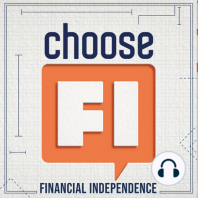24 min listen
295 | Emergency Fund for the Zombie Apocalypse
FromChooseFI
ratings:
Length:
56 minutes
Released:
Feb 12, 2021
Format:
Podcast episode
Description
This Friday's episode continues with the theme of looking back at how our perspective has changed since the show began. What has changed, have we pivoted, and what do we feel more confident about now than we did then? Last Friday Brad shared the saga of trying to find out how much a CT scan was going to cost him. In response to the story, members of the community reached out with their ideas for saving on the cost. One listener shared a link for MDsave.com, a company that contracts with different healthcare providers to provide very specific pricing for a number of healthcare-related services and procedures that you pay in advance for. Using the CPT code for his procedure, Brad discovered there were no providers in his area, but there was a good number in Charlottesville about an hour away. Had he used this website, he could have paid under $300 for his CT scan. Without using it, his insurance company was billed $2,083. For prescription drug needs, there is a similar website called GoodRX.com The healthcare system is broken. Price transparency in healthcare, like both of these websites offer, cuts the middleman out and lowers costs. Jonathan suspects that anytime you are using these apps you are sacrificing some privacy. If you have a high-deductible plan and rarely if ever reach it, you may be better with the discount as you cannot double-dip and need to choose whether you go through the app/discount card or your insurance company. However, prescriptions do qualify as HSA reimbursable expenses. Emergency funds are a part of every financial plan, with most stating a fully funded fund contains three to six months' worth of expenses. ChooseFI has pushed back a little on the standard emergency fund concept, asking if you really need one, what does it need to look like, and what are we protecting ourselves from? Both Brad and Jonathan's perspective on the emergency fund has changed over the years. Most personal finance experts conceptualize it as money sitting around doing nothing waiting for an emergency to occur. The further down the path to FI you travel, the role of the emergency fund begins to change. At what point should you stop allowing your emergency fund to lose value from inflation and invest it instead? When first starting out, a fully-funded emergency benefit provides psychological benefits. But 1o-15 years down the path to FI, there are very few true emergencies. There is an opportunity cost to your money sitting on the sidelines. Could you have that money invested, earning and growing for you? Brad can't think of a scenario where he would need thousands of dollars in cash in a hurry. Even if the unthinkable were to happen, he could pay with a credit card or a check. Worst case scenario is that he would need to access money by selling funds in an investment account and he would have it two to three days later. For individuals just starting out and moving away from living paycheck to paycheck, having $1,000 available in cash as a crisis fund makes a lot of sense. Brad keeps a couple thousand dollars extra in his checking account just so that he never needs to worry. There is an opportunity cost, but he finds it worth the peace of mind. Jonathan tries to keep as little in cash around as possible. He has one or two months' worth of expenses in cash. Because he knows his monthly expenses, when he gets paid, he's able to save first, get it invested, and live off the remainder. Interest rates on bank accounts are so low that there's no incentive to keep it there. Inflation alone erodes the value of money by an average of 3% per year. Is there a way to hedge against inflation while still meeting a need for liquidity? Beginners may need to keep their money sitting in a savings account to feel comfortable. Once you get to the point where you can put money away and realize you aren't going to touch it for 30-50 years no matter how the market fluctuates, start investing. March 2020 was without a doubt, a black swan event. Was a
Released:
Feb 12, 2021
Format:
Podcast episode
Titles in the series (100)
006 | The Power of Partnerships | ChooseFI Origin Story: In Today’s Podcast we cover: The Power of Partnerships How Brad and Jonathan met Our decision to partner up on Choose FI The importance of taking action The value of personal relationships in an online world by ChooseFI
